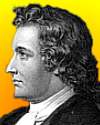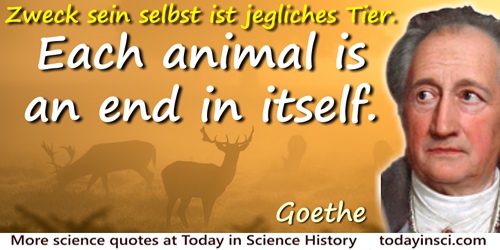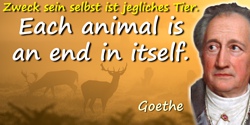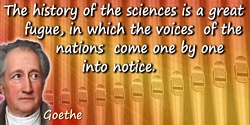 (source)
(source)
|
Johann Wolfgang von Goethe
(28 Aug 1749 - 22 Mar 1832)
German poet, zoologist, botanist and geologist who an intellectual with an interest writing on science, but was primarily famous for poetry and literature.
|
Johann Wolfgang von Goethe Quotes on Evolution (7 quotes)
>> Click for 137 Science Quotes by Johann Wolfgang von Goethe
>> Click for Johann Wolfgang von Goethe Quotes on | Nature | Science And Art |
>> Click for 137 Science Quotes by Johann Wolfgang von Goethe
>> Click for Johann Wolfgang von Goethe Quotes on | Nature | Science And Art |
Zweck sein selbst ist jegliches Tier.
Each animal is an end in itself.
Each animal is an end in itself.
— Johann Wolfgang von Goethe
'Metamorphose der Tiere' (1806), in David Luke (ed.), Goethe (1964), 152.
Everything that comes into being seeks room for itself and desires duration: hence it drives something else from its place and shortens its duration.
— Johann Wolfgang von Goethe
In The Maxims and Reflections of Goethe (1906), 199.
Nature! … She creates needs because she loves action. Wondrous! that she produces all this action so easily. Every need is a benefit, swiftly satisfied, swiftly renewed.—Every fresh want is a new source of pleasure, but she soon reaches an equilibrium.
— Johann Wolfgang von Goethe
As quoted by T.H. Huxley, in Norman Lockyer (ed.), 'Nature: Aphorisms by Goethe', Nature (1870), 1, 10.
Nothing is more consonant with Nature than that she puts into operation in the smallest detail that which she intends as a whole.
— Johann Wolfgang von Goethe
Jeremy Naydler (ed.), Goethe On Science: An Anthology of Goethe’s Scientific Writings (1996), 59.
Progress has not followed a straight ascending line, but a spiral with rhythms of progress and retrogression, of evolution and dissolution.
— Johann Wolfgang von Goethe
As given, without citation, in Kate Louise Roberts (ed.), Hoyt’s New Cyclopedia of Practical Quotations (1922), 635.
The Primal Plant is going be the strangest creature in the world, which Nature herself must envy me. With this model and the key to it, it will be possible to go on for ever inventing plants and know that their existence is logical; that is to say, if they do not actually exist, they could, for they are not the shadowy phantoms of a vain imagination, but possess an inner necessity and truth. The same law will be applicable to all other living organisms.
— Johann Wolfgang von Goethe
To Herder, 17 May 1787. Italian Journey (1816-17), trans. W. H. Auden and Elizabeth Mayer (1970), 310-11.
Whatever Nature undertakes, she can only accomplish it in a sequence. She never makes a leap. For example she could not produce a horse if it were not preceded by all the other animals on which she ascends to the horse’s structure as if on the rungs of a ladder. Thus every one thing exists for the sake of all things and all for the sake of one; for the one is of course the all as well. Nature, despite her seeming diversity, is always a unity, a whole; and thus, when she manifests herself in any part of that whole, the rest must serve as a basis for that particular manifestation, and the latter must have a relationship to the rest of the system.
— Johann Wolfgang von Goethe
Jeremy Naydler (ed.), Goethe On Science: An Anthology of Goethe's Scientific Writings (1996), 60
See also:
- 28 Aug - short biography, births, deaths and events on date of Goethe's birth.
- Goethe's Way of Science, by David Seamon. - book suggestion.




 In science it often happens that scientists say, 'You know that's a really good argument; my position is mistaken,' and then they would actually change their minds and you never hear that old view from them again. They really do it. It doesn't happen as often as it should, because scientists are human and change is sometimes painful. But it happens every day. I cannot recall the last time something like that happened in politics or religion.
(1987) --
In science it often happens that scientists say, 'You know that's a really good argument; my position is mistaken,' and then they would actually change their minds and you never hear that old view from them again. They really do it. It doesn't happen as often as it should, because scientists are human and change is sometimes painful. But it happens every day. I cannot recall the last time something like that happened in politics or religion.
(1987) -- 


